We Ranked All 17 of the Coen Brothers Movies, Including 'Hail, Caesar!'
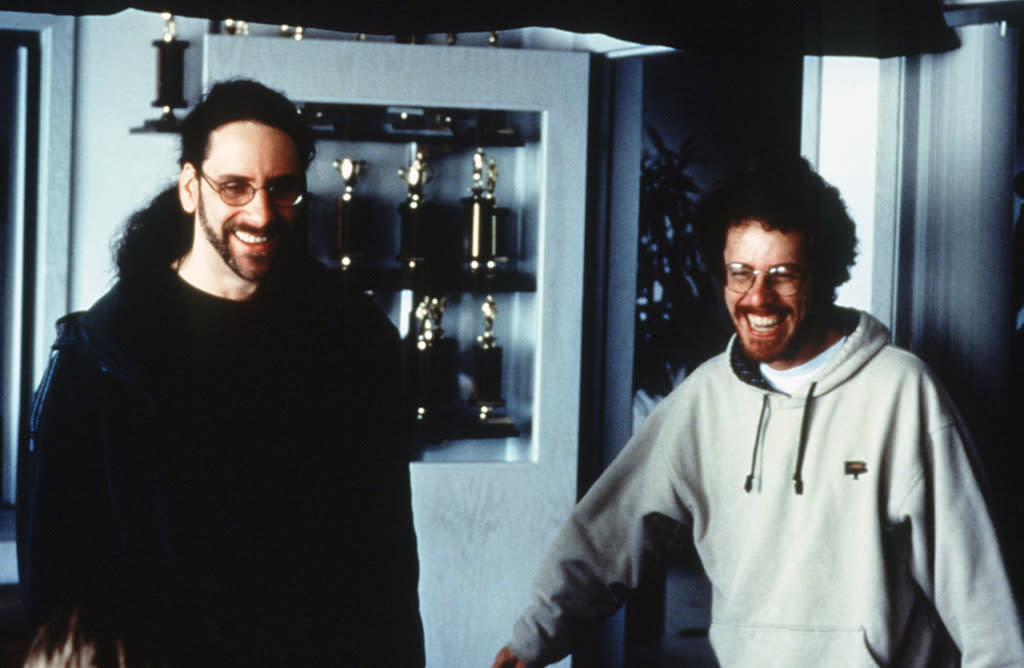
Joel and Ethan Coen on the set of ‘Fargo’ (Everett)
There are few American filmmakers as idiosyncratic as Joel and Ethan Coen, the writing-directing-producing siblings who for the past 32 years have concocted some of cinema’s most scintillatingly severe and surreally silly masterpieces. Equally fond of film noir, screwball comedy, musicals, gangster sagas, and character dramas, the Coens have exhibited an unparalleled ability to channel their various influences into something distinctly their own. With their best films always guided by their unmistakable tone — part droll absurdity, part soul-deep terror, part fatalistic resignation — the Coens have yet to make a truly bad movie, and that streak continues with this week’s Hail, Caesar!, a crime-comedy set in 1950sHollywood. In honor of their latest — and setting aside their screenwriting-only efforts as well as their two contributions to anthologies (2006’s Paris, je t’aime and 2007’s To Each His Own Cinema) — we ranked the Coen brothers’ directorial oeuvre, a body of work that stands toe to toe with that of any living filmmaker.
Watch a video about our Coen brothers’ ranking:
17. The Ladykillers (2004)
If the Coens have a single glaring misstep in their canon, it’s this 2004 remake of the classic Ealing Studios comedy about a group of thieves who rent a flat from which they can secretly dig a tunnel into a nearby casino vault. The catch is that they’re a bumbling bunch of buffoons, and their elderly landlady is far less clueless than they had hoped. It’s a sturdy comedic setup that the Coens fail to deftly execute, due in large part to performances that are too cartoonish (led by Tom Hanks, affecting a Colonel Sanders-style Southern dandy twang and outfit), as well as a tone that’s never as rollickingly funny as required. While a cascading sequence of out-there events should lead to hilarity, The Ladykillers meanders along like a film that never quite knows how ludicrous it wants to be — or, as with Hanks’s performance, strains far too hard for inspired ridiculousness.
Related: We Ranked All 29 Steven Spielberg Movies, from Worst to Best
16. The Hudsucker Proxy (1994)
There’s such technical artistry on display throughout 1994’s The Hudsucker Proxy that it’s a shame the skill is in service of a wannabe-whimsical tale that’s devoid of actual whimsy. The Coens’ gorgeous ode to ’50s moviemaking is, on a purely aesthetic level, a triumph. Alas, there’s a story to be told here, and it’s a grating one about a mailroom clerk (Tim Robbins) hired by an evil exec (Paul Newman) to run his company so that it can tank and the board can buy up all the shares — a plot that fails when Robbins’s aw-shucks everyman strikes it rich by inventing the Hula-Hoop. Newman is deviously great, but Robbins and Jennifer Jason Leigh (as a go-getting newspaper reporter) are all wrong for their parts; he seems too smart for such an Average Joe, and she comes across as a motor-mouthed, faux-Katharine Hepburn caricature. While the Coens’ fondness for cinematic history is palpable, the film feels like a labored love letter that should have stayed unwritten.
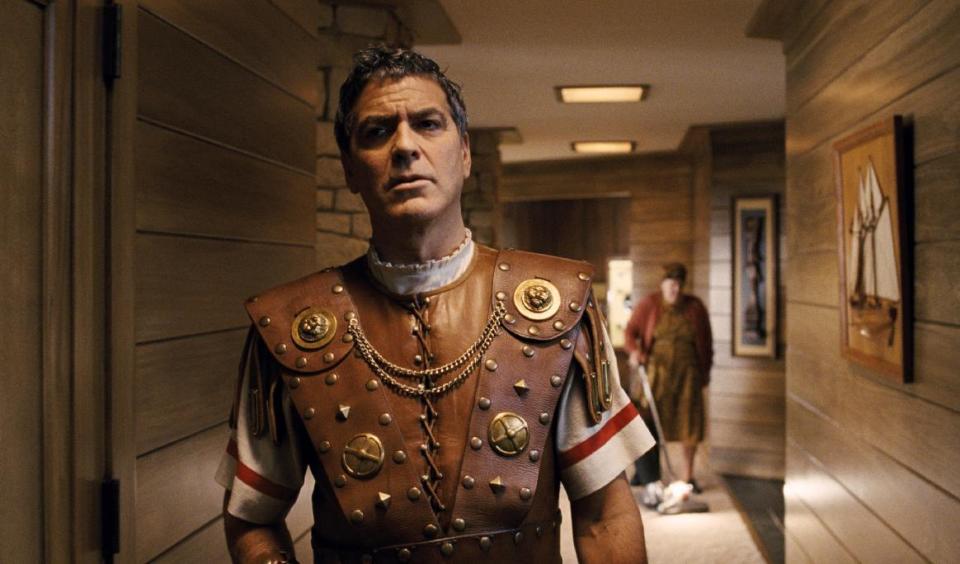
George Clooney in ‘Hail, Caesar!’ (Universal Pictures via AP)
15. Hail, Caesar! (2016)
With sarcastic affection, the Coens celebrate the various fictions involved in classic Hollywood moviemaking in this rapid-fire farce that often moves too fleetly for its own good. Focused on a 1950s studio bigwig named Eddie Mannix (Josh Brolin), who is responsible for keeping his dream factory running smoothly, the film is a narratively splintered affair that flip-flops between numerous points of interest, including Mannix’s efforts to locate a Roman epic-headlining movie star (George Clooney) who’s been kidnapped by communists; manage the unwed pregnancy of an Esther Williams-type water-ballet starlet (Scarlett Johansson); and nurture the budding career of a cowpoke matinee idol (Alden Ehrenreich). Reverent sequences of choreographed big-screen spectacle (highlighted by a Channing Tatum tap-dance routine) are invariably punctuated by artifice-exposing punchlines. Too often, however, the material’s manic momentum does much to negate its humor, the best of which comes during a prolonged bit featuring a proper British director (Ralph Fiennes) struggling to get Ehrenreich’s actor to drop his Western drawl. The movie never quite coheres, but it’s still a madcap paean to the movies as phony — yet rousing — entertainments.
14. Intolerable Cruelty (2003)
Divorce is the gateway to love in Intolerable Cruelty, the Coens’ zingy rom-com about a superstar divorce attorney (George Clooney) who, after settling a suit that leaves a money-hungry wife (Catherine Zeta-Jones) without any of her ex-husband’s loot, winds up with a target on his own back when she tries to exact revenge by making him fall in love with her. The Coens’ direction is as lively as ever, and their script is overflowing with rat-a-tat verbal volleys. Moreover, Clooney and Zeta-Jones share a contentious chemistry that produces just enough sparks to keep the brisk, twisty-turny plot from falling flat. Unfortunately, the filmmakers’ trademark cynicism doesn’t mesh with their material’s climactic celebration of happily-ever-after amour, and the result is a pleasant, if chilly, expert facsimile of an old-school screwball charmer.
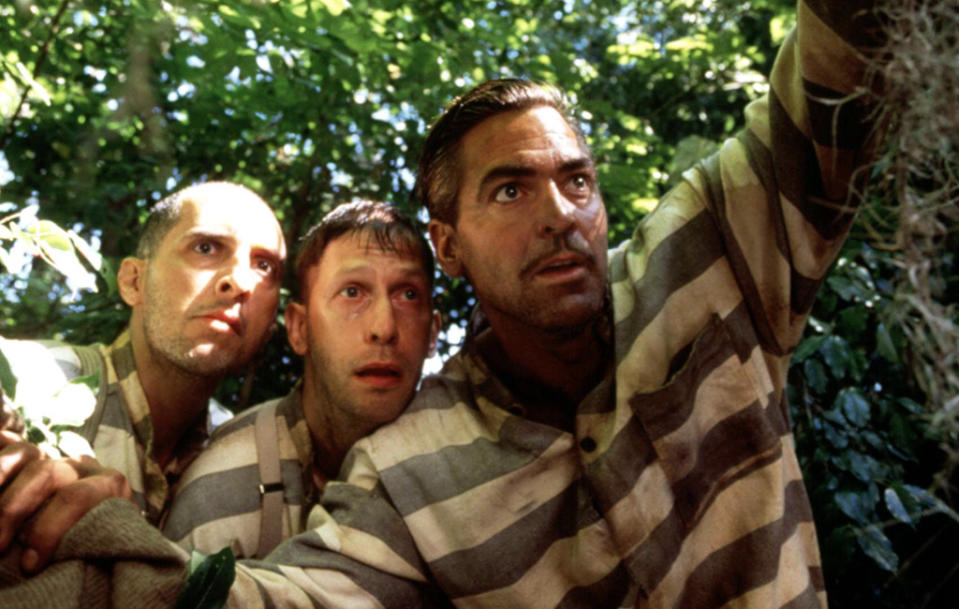
John Turturro, Tim Blake Nelson, and George Clooney in ‘O Brother’ (Everett)
13. O Brother, Where Art Thou? (2000)
A sizeable hit upon its release thanks to its Grammy-winning soundtrack overseen by T Bone Burnett, O Brother is a charmingly goofy slice of Americana. Shot by Roger Deakins with spectacular color-corrected grace and beauty, the Coens’ 2000 film takes as its very loose inspiration Homer’s The Odyssey. The story of three convicts (George Clooney, John Turturro, and Tim Blake Nelson), who escape their chain gang and set out to find buried treasure and reunite with loved ones, it’s a road-trip saga steeped in 1930s-era folk music, Southern-backwater atmosphere, and old-movie adoration. As the hair-creamed leader of this oddball trio, Clooney is all megawatt grins and loose limbs, and his compellingly corny performance proves the axis around which the film’s bevy of set pieces — involving the KKK, a soul-selling blues guitarist (Chris Thomas King), a Cyclops-like Bible salesman (John Goodman), and a devilish sheriff (Daniel von Bargen) — all revolve. Its narrative and thematic underpinnings are slight, but its aesthetic pleasures are anything but.
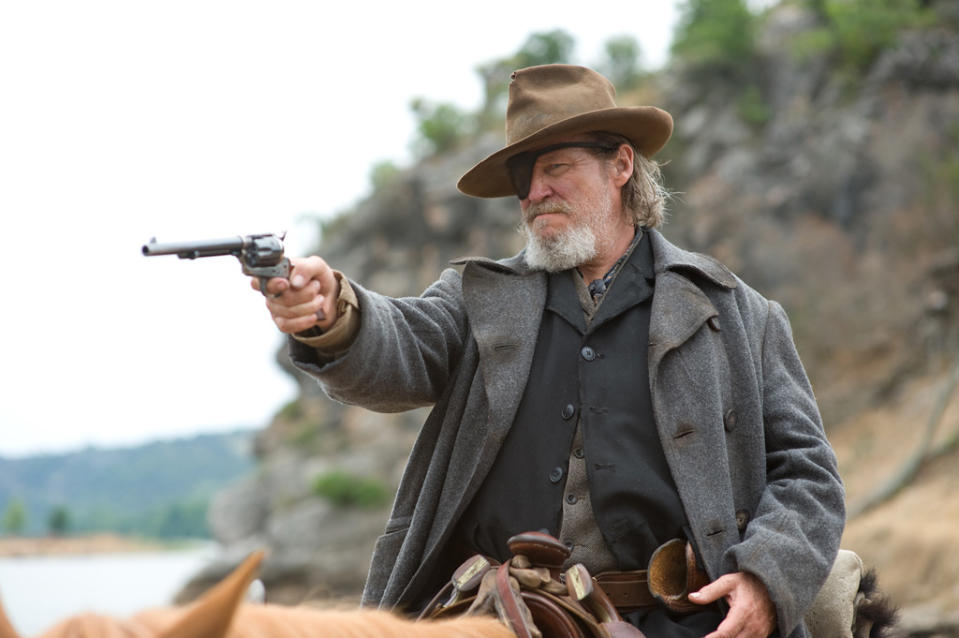
Jeff Bridges in ‘True Grit’ (Wilson Webb/Paramount Pictures)
12. True Grit (2010)
The second big-screen adaptation of Charles Portis’s novel (after the 1969 John Wayne version), True Grit finds the Coens venturing out into the vast, barren plains of the Old West, where a 14-year-old girl (Hailee Steinfeld) hires aging, boozy U.S. Deputy Marshal Rooster Cogburn (Jeff Bridges) to help her track down the men responsible for killing her father. Their odd-couple rapport provides a sturdy backbone for a story that soon finds them teaming up with a Texas Ranger (Matt Damon) also interested in capturing the fiends, with the directors (working with frequent cinematographer Roger Deakins) lavishing striking visual attention on their protagonists’ alternately youthful, stubborn, and scraggly countenances. The film is a stirring — and, in a breathtaking race to safety across a starry wasteland, haunting — portrait of the “true grit” required to achieve justice, although its unhurried pace and uncomplicated plotting render it one of their most unsurprising, straightforward efforts.
11. Burn After Reading (2008)
At once frothy, manic, and bitter, Burn After Reading was a tonal 180-degree turn from the Coens’ prior No Country for Old Men — except, however, in its conception of a world in which the good are just as likely to be punished as the wicked. Assembling an all-star cast (George Clooney, Brad Pitt, John Malkovich, Frances McDormand, Tilda Swinton, Richard Jenkins, J.K. Simmons) for an account of all-consuming inanity, their story plays like a round-robin game of CIA incompetence, one in which vanity, ego, ambition, and spinelessness combine to thwart virtually everyone’s plans. Nominally about a misplaced CD containing supposed top-secret information, the film is really an elaborate, intricately plotted cartoon about government — and individual — stupidity. Whether viewed as a loopy indictment of U.S. intelligence operations or simply as a portrait of humanity’s preternatural capacity for acting as dumbly as possible, this all-over-the-place comedy plants its tongue so firmly in its cheek that it becomes sore.
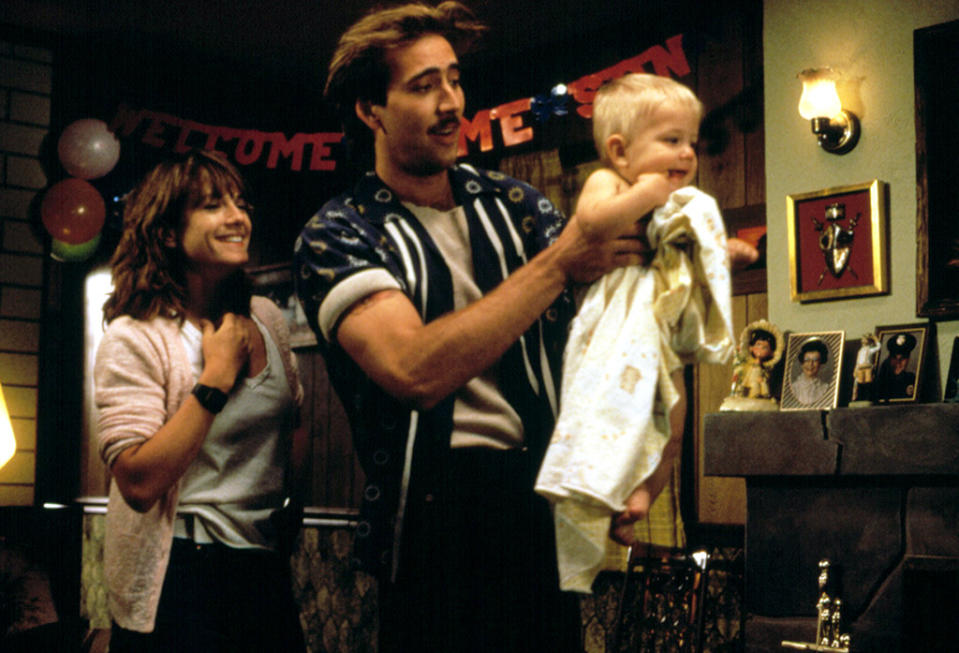
Holly Hunter and Nicolas Cage in ‘Raising Arizona’ (Everett)
10. Raising Arizona (1987)
For the follow-up to their maiden effort, 1984’s Blood Simple, the Coens went in the completely opposite direction, delivering a frenetic, ferociously funny farce about a mismatched, infertile married couple — a police officer (Holly Hunter) and a chronic convenience store robber (Nicolas Cage) — who kidnap one of a furniture-sales businessman’s five newborns. That results in a madcap adventure involving ex-cons, bank robberies, bounty hunters, and other assorted over-the-top characters and scenarios that are dramatized with flamboyant formal dexterity by the Coens. Cage and Hunter’s manic performances are highly attuned to the filmmakers’ zany energy, and, in a supporting turn, John Goodman flashes the sort of outsized dynamism that would subsequently make him one of the Coens’ favorite collaborators. Though hardly as substantial as some of their other comedies, Raising Arizona has the smarty-pants vivacity of a Southwestern Looney Tunes short come to real-world, feature-length life — and stands as a priceless comedy by two artists still figuring out the limits of their visual and storytelling skills.
Related: We Ranked All 23 Ron Howard Movies, from Worst to First
9. A Serious Man (2009)
Woe is Larry Gopnick (Michael Stuhlbarg), a Jewish physics professor living in late-’60s Minnesota suburbia, whose personal and professional lives are rapidly collapsing. His wife (Sari Lennick) is leaving him for one of his colleagues (Fred Melamed); his son (Aaron Wolff) is a pot-smoking mess; his brother (Richard Kind) is sleeping on his couch; and his quest for tenure is not going as planned. Gopnick is a Job-like figure who can’t understand his own situation or the world around him, and his search for solace through religion only leads to further confusion and misery. Despite the absence of gangsters and killers, the Coens’ 2009 film is arguably their harshest and most unsettling, given how steeped it is in the idea that questions of faith, fate, and chance may have no easy answers, if they can be answered at all. Culminating with a moment of looming apocalyptic disaster that seems apt for a biblical tale of life’s incomprehensible cruelty, this character study finds the directors at their most oppressively pessimistic, even as their highly specific evocation of time, place, and character affords them plenty of opportunities for caustic humor.
8. The Man Who Wasn’t There (2001)
The most overtly self-conscious and mannered of the Coens’ many film noirs, The Man Who Wasn’t There proves a sumptuous black-and-white ode to the filmmakers’ favorite genre. Shot by Deakins with immaculate monochromatic beauty, the Coens’ 2001 film concerns a stoic barber (Billy Bob Thornton) in 1949 California who decides to blackmail his wife’s (Frances McDormand) boss and lover (James Gandolfini) so he can acquire the money necessary to invest in a dry-cleaning business. This relatively minor crime is the catalyst for a story of ever-greater complications, including the barber’s relationship with his friend’s teenage daughter (Scarlett Johansson). Melding existential sorrow with out-of-this-world craziness (there’s a late plot thread involving a UFO), the action is staged with a formal precision that helped nab Joel the Best Director prize at the Cannes Film Festival. An homage of peculiar, beguiling power, the film employs affected aesthetics that, while slightly suffocating, create an almost overpowering sense of loneliness, dissatisfaction, and yearning for escape.
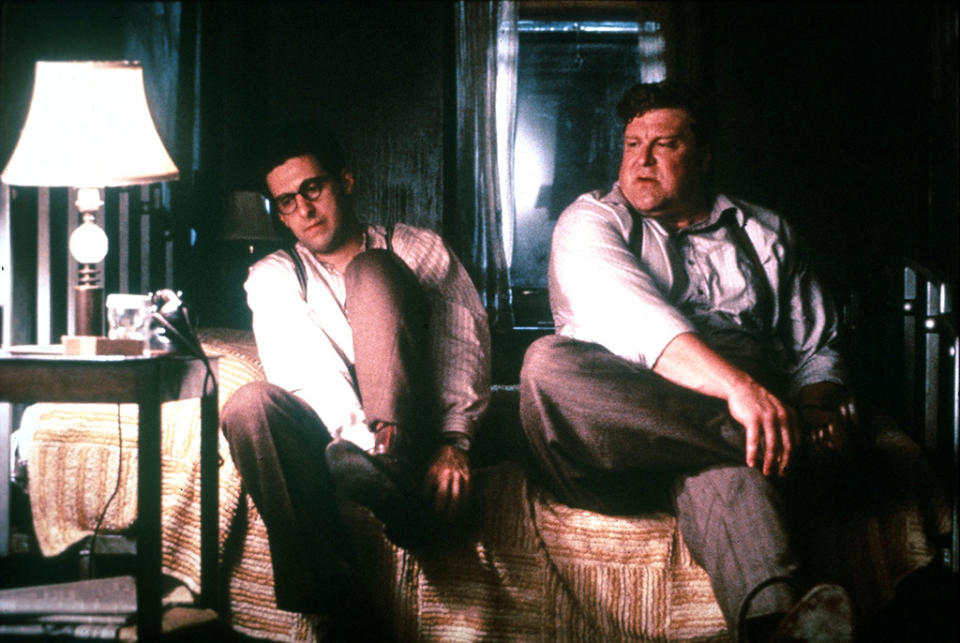
John Turturro and John Goodman in ‘Barton Fink’ (Everett)
7. Barton Fink (1991)
Though it nabbed the Cannes Film Festival’s three biggest prizes (Best Picture, Director, and Actor), Barton Fink was met with minimal interest from domestic audiences, likely because the film is a strange, off-kilter work that fluctuates between different tones, styles, and genres. While its unconventionality may have limited its box-office potential, the Coens’ 1991 film is an arresting, dreamlike character study about the titular 1940s New York City playwright (Turturro) who relocates to California to write movie scripts. In La La Land, Fink moves into a dilapidated hotel where he befriends a gregarious insurance salesman (John Goodman), and — after suffering from writer’s block — comes to spend time with a drunk, angry author (John Mahoney) loosely based on William Faulkner. The clash between East and West Coast intellectualism, upper and lower classes, literary and mainstream art, novels and the movies all inform Fink’s quest to make something of himself, and the Coens infuse their tale with all manner of allusions and symbolism that resist easy explanation.
6. Miller’s Crossing (1990)
There are many things to admire about the Coens’ third feature, a gangster saga, a stunning showcase of 1920s costume and set design, and of striking cinematography by Barry Sonnenfeld, in the last of this three Coen brothers collaborations. It’s an expertly written cornucopia of tough-guy one-liners and retorts, all of them oozing with affection for the hardboiled genre to which this convoluted story — about a criminal adviser (Gabriel Byrne) trying to play both sides of a Prohibition turf war — pays such loving homage. And it’s a vehicle for the finest acting of John Turturro’s career. As a bookie caught between the two underworld factions, Turturro radiates frantic, weasely desperation that climaxes in an unforgettable forest-set scene. A film for lovers of genre films and crime fiction, it plays like an assured, calculating riff on its predecessors, expressing — in every beautifully composed frame — a level of emotional and psychological depth that’s nothing short of bracing.
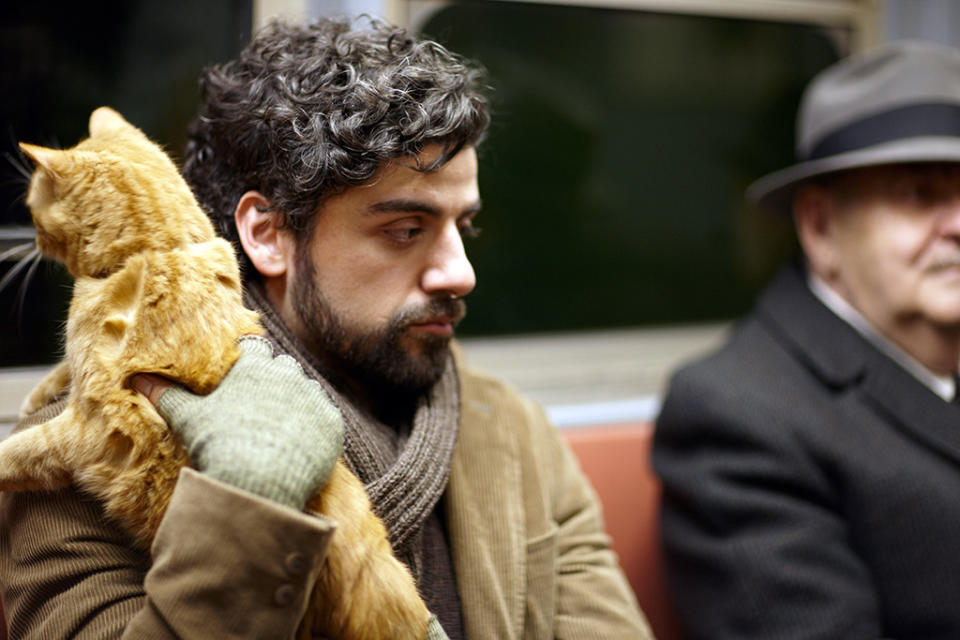
Oscar Isaac in ‘Inside Llewyn Davis’ (Everett)
5. Inside Llewyn Davis (2013)
The Coens’ love of film noir means they’re attracted to characters whose endearing quests for contentment are often preordained for failure. As such, this film’s aspiring folk singer-songwriter (Oscar Isaac) is something like the model Coen protagonist, a man with talent and ambition to spare, but little in the way of luck. Be it trying to track down a cat on New York City’s cold winter streets or trekking out to Chicago to audition for a gig, Davis is a tenacious dreamer lacking in good fortune, and his dogged, doomed attempts to right his course are depicted with such good-humored compassion by the Coens that it’s impossible to not root for him. Bolstered by sterling cameos from John Goodman and F. Murray Abraham, the film captures the look, feel, and atmosphere of its 1960s Greenwich Village era and music scene, as well as exudes a melancholy empathy for Davis, who’s embodied by Oscar Isaac with an irresistible mixture of desolation and drollness at a life that’s made not for the stage’s spotlight, but for the club’s back alleys.
4. The Big Lebowski (1998)
A blissful surrealist-stoner variation on a Raymond Chandler novel, The Big Lebowski has justly earned cult-classic status. Driven by an iconic Jeff Bridges performance as the robe-and-sandaled “the Dude,” it’s a frantically circuitous crime saga embellished by a collection of unrivaled comedic supporting turns from John Goodman, John Turturro, Julianne Moore, Steve Buscemi, Phillip C. Hoffman, Peter Stormare, and Sam Elliott. Kick-started by the bespoilingof the Dude’s rug, the story unspools as a serpentine odyssey through a cartoonish criminal wonderland populated by psychos, sickos, and everyday losers. At the center of this maelstrom is the Dude, a disheveled doofus whose go-with-the-flow attitude — laced with mounting frustration at his wacko circumstances — is emblematic of the bizarre proceedings. Its gonzo humor masking, if just barely, its air of hopelessness, Lebowski revels in outrageousness even as it casts a sardonic eye toward its characters’ stabs at bringing order to an anarchic world.
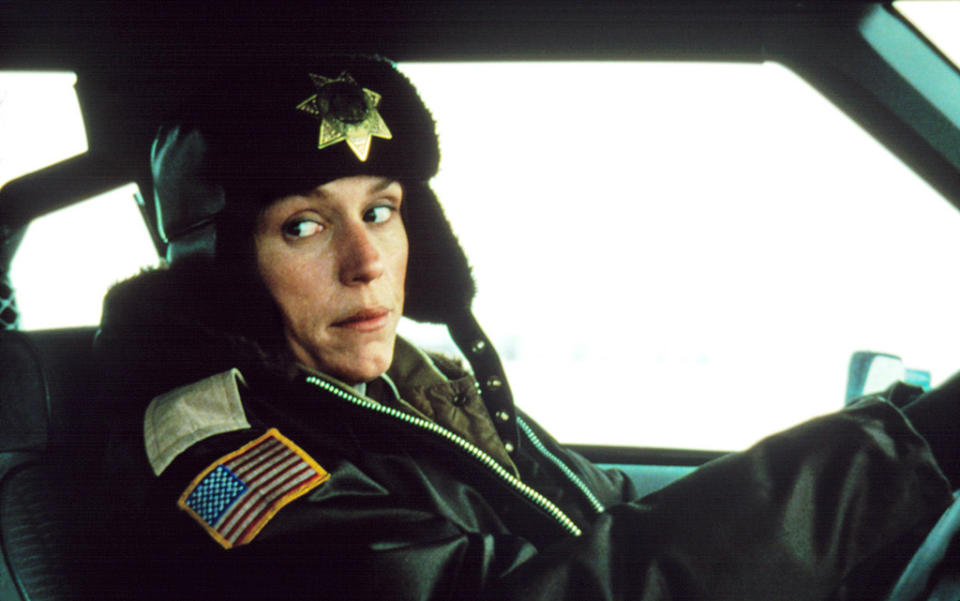
Frances McDormand in ‘Fargo’ (Everett)
3. Fargo (1996)
A mainstream breakthrough, Fargo earned a Best Director prize for Joel at Cannes, a Best Original Screenplay Oscar for both brothers, and a Best Actress Oscar for star Frances McDormand. The inspiration for FX’s superb TV series of the same name, it stands as a pitch-perfect black comedy about human failings and the cruel hand of fate. Set largely in 1987 Minnesota, the story is a wild, careening beast of coincidences, bad timing, and even worse decisions, all of it instigated by a desperate car salesman (William H. Macy) who hires a couple of criminals (Steve Buscemi and Peter Stormare) to kidnap his wife so he can then ransom her back to her wealthy father. Murder, mayhem, and madness ensue, leaving a pregnant police chief (McDormand) to sort through the debris left in these wood chipper-loving characters’ wake. Enlivened by McDormand in a sterling turn that exhibits a wellspring emotional depth and humor, it plays like the deranged love child of Blood Simple and Raising Arizona, synthesizing the Coens’ silly and serious impulses better than any of their other works. It is, in short, the prototypical “Coen brothers movie.”
2. No Country for Old Men (2007)
Winner of the 2007 Best Picture Oscar, the Coens’ adaptation of Cormac McCarthy’s tale of avarice and unstoppable brutality is as tense, mesmerizing, and profound as anything they’ve produced. Charting the fallout from a man’s (Josh Brolin) decision to take a stash of money found alongside a corpse — which makes him the target of a ruthless assassin (Javier Bardem) wielding a stunbolt cattle gun — the film is a doom-laden affair in which every step, every choice, every word has the potential for inciting destruction. A harrowing thriller, it presents the West as a landscape of irrational violence, long divorced from conventional ideas about noble lawmen, righteous cowboys, and villainous desperados. That idea comes through most fully in the final scenes involving Tommy Lee Jones’s powerless sheriff, but it infests the entirety of No Country for Old Men like a plague. In the process, it makes the film perhaps the Coens’ most powerful statement about the futility of seeking justice in a mad, indifferent world.
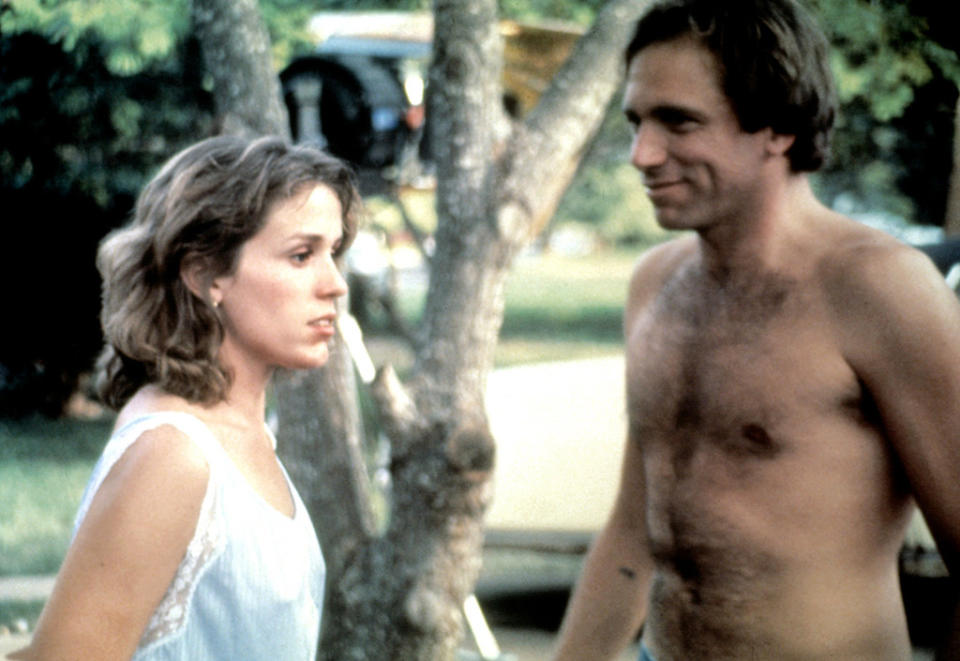
Frances McDormand and John Getz in ‘Blood Simple’ (Everett)
1. Blood Simple (1984)
The Coens’ 1984 debut is arguably the apex of neo-noir, a blistering saga of Texas deception, vengeance, greed, and amorality that immediately established the brothers as filmmaking wunderkinds, elicited a career-best performance from character actor M. Emmet Walsh, and provided the first big-screen role to Frances McDormand. (She’d go on to star in many Coen films, as well as marry Joel.) Channeling the spirit of James M. Cain, Jim Thompson, Dashiell Hammett, Elmore Leonard, and other famed American crime novelists, this grim masterpiece concerns a bar owner (Dan Hedaya) who hires a private investigator (Walsh) to follow his wife (McDormand), whom he rightly suspects is being unfaithful. When his suspicions are confirmed, he plots to have her killed. That age-old setup is the jumping off point for a tangled story of unbearable nerve-jangling anxiety and black humor, as well as a vehicle for the formally breathtaking direction (aided by cinematographer/future Men in Black director Barry Sonnenfeld) and mordant, incisive writing that would become their hallmark. Rife with twists and turns of betrayal and murder that speak to humanity’s basest impulses — and the pointlessness of trying to transcend one’s lot in life — it’s an enduring classic of nasty people doing nasty things with nasty results.
